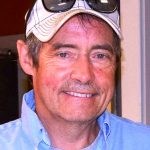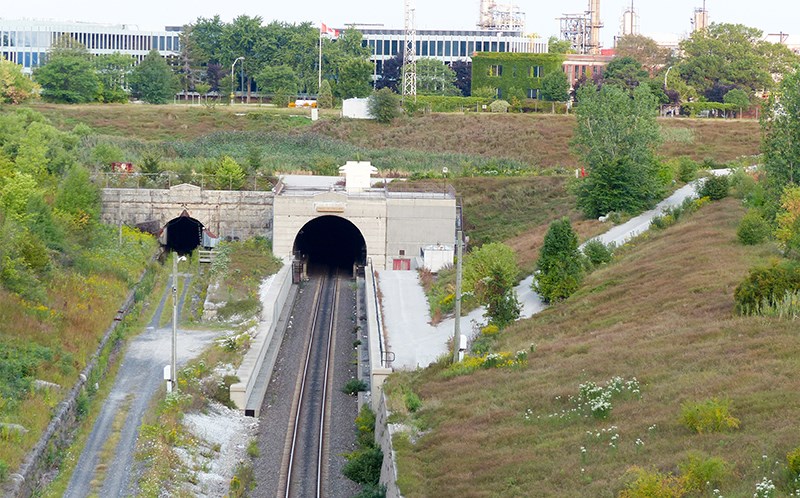Cathy Dobson
Miguel Padron knew that entering Canada illegally on foot through the St. Clair River Tunnel was dangerous, but says he was desperate to escape rising racism in the United States.
He walked into the tunnel beneath the river, enduring train engine fumes that he says made him dizzy, and arrived an hour later in Canada.

Padron, who now lives in housing provided by a Sarnia homeless shelter, said he left his rented home and job as a gymnastics coach in Detroit because of U.S. President Donald Trump’s push to deport illegal residents.
“I risked my life to come through the tunnel,” said the 57-year-old Cuban national. “I was thinking about swimming across but people told me I’d get sucked under the water.”
He slipped on a backpack with $180 and an extra pair of shoes and left the U.S. on Tuesday, July 4.
“I picked that day because I knew it was a holiday and they’d be busy partying,” he explained.
He ignored the Windsor-Detroit border crossing because there “they watch 24/7 at both their bridge and tunnel,” he said.
Instead, he travelled an hour north to Port Huron, Michigan where the St. Clair narrows and the Blue Water Bridge connects the two countries. But the bridge is off limits to pedestrians and attempting to walk it would have resulted in U.S. detention, Padron said.
So he watched the train traffic travelling through the St. Clair tunnel for several hours and, just after 10 p.m., made a run for it under the river.
“I waited for a train to pass and knew it would be a long time for another one,” he said.
No other trains appeared as he travelled through the corridor, which measures 1.87 kilometres (1.16 miles) from portal to portal.
When he emerged in Sarnia’s south end he hid in some nearby bushes.
“An alarm went off and some police came,” he said. “I surrendered, because where else am I going to go?”
Padron said he also wants to live in Canada because he no longer feels safe in the U.S.
“My neighbour robbed me in February and took everything. There’s a lot of hate in the States, a lot of racism,” he said.
Padron said he spoke to The Journal because he wants others to know how frightened illegal immigrants have become in Trump’s America.
“I was afraid I’d be deported with the Mexicans,” he said.
The CN Police, which provides security for the railway, found Padron near the tunnel entrance that night. Officers took him to the Canada Border Services Agency (CBSA) in Point Edward where he was questioned.
“I was told they didn’t want to put me in jail because I’m not a criminal,” Padron said.
The CBSA would not address his specific case, but sent The Journal a written statement explaining that when a person claims refugee protection his or her eligibility is determined under the Immigration and Refugee Protection Act.
The process includes an interview, fingerprinting, photos and a security and criminal record check. If the applicant is eligible, the file is referred to the Immigration and Refugee Board for consideration, the agency said.
Patron said he was directed to a local motel where he stayed a few nights until his money ran out.
“Then they told me about this place,” Padron said in the living room of the River City Sanctuary, a homeless shelter on Mitton Street.
He lived at the shelter about a month before being moved to one of River City’s transitional apartments.
“We saw something in Miguel that is unique and different,” says Tom Hillis, who works with the shelter’s housing program.

Padron is the first shelter resident that admits to entering Canada illegally and seeking refugee status.
“He doesn’t touch drugs and he is vulnerable,” said Hillis. “We don’t want him to fall into a life of crime so we’re taking him under our wing.”
Padron said he meets regularly with immigration officials and is hoping to learn this week what his next steps should be.
He said he was denied refugee status by the U.S. and nearly 30 years ago by Canada as well. He said he doesn’t want to return to Cuba, the only country he can enter legally.
“I left Cuba in 1988 and my family there says don’t come back. I have been away too long and I’m democratic now.
“If I go to Cuba I can’t speak out at all. If I’m sent back to Cuba, I’ll be sent to jail,” he said.
Padron said he wants to lead a “normal” life in Canada.
“I want to get out of limbo. I’m tired of being wild. I am a gymnastics coach. I love that. I just want my life back.”
Hillis said River City is prepared to help Padron until he is able to legally work in Canada.

But the shelter’s resources are very limited, said supervisor Owen Vroom. “We need a group or church organization to help Miguel out.
“Miguel has been amazing,” he added. “He is welcome for as long as it takes.”
